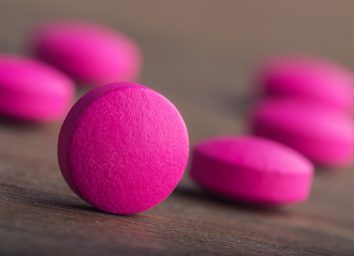Science Says This Supplement Can Help You Control Your Weight

Selenium is a mineral that is naturally found in soil and water and has gained recent attention in the science community for its potential role in helping the human body bolster its coronavirus defenses. According to a new study published last month in the journal Nutrition, scientists observed that selenium deficiency is indeed a common factor among people who have contracted COVID-19 compared to “healthy controls.”
Furthermore, Chinese scientists have speculated recently in a new study that one potential reason why a single province in the country experienced extremely low infection rates (only six COVID-19 cases per 100,000 residents) is that the province is also home to the world’s richest deposit of selenium, and “human selenium levels may contribute to antioxidant, anti-inflammatory, and immune effects in COVID-19.” (The selenium levels are apparently so high among residents that many experience side effects that include hair loss.)
Whatever the connection between selenium and the coronavirus, there is plenty of evidence that links selenium to your weight, your metabolism (it helps your thyroid function properly, the gland that regulates your metabolism), your cancer defenses, and your overall health.
“Selenoproteins, in which selenium is present as selenocysteine, present an important role in many body functions, such as antioxidant defense and the formation of thyroid hormones,” says a 2013 study published in the journal Molecules. “Some selenoprotein metabolites play a role in cancer prevention. In the immune system, selenium stimulates antibody formation and activity of helper T cells, cytotoxic T cells, and Natural Killer (NK) cells.”
According to the Mayo Clinic, selenium is largely found in “seafood, liver, lean red meat, and grains grown in soil that is rich in selenium.” The National Institutes of Health (NIH) says that selenium-rich foods include oysters, halibut, yellowfin tuna, eggs, Brazil nuts, sardines, sunflower seeds, chicken breast, and shiitake mushrooms. The Recommended Dietary Allowance for selenium is 55 mcg per day for anyone over the age of 14. “Selenium deficiency is very rare in the United States and Canada,” notes the NIH.
Still, side effects from a deficiency in selenium range from muscle weakness to fatigue, hair loss to mental fog, infertility (in both sexes) to an immune system that isn’t at full power. Studies show that getting enough selenium is important for women who are pregnant.
If you fear that you may not be getting enough selenium—and you may be experiencing weight gain—you should seek help from a medical professional. But science indicates that you may wish to consider a selenium supplement. According to one 2020 study of 37 overweight or obese people published in the International Journal of Endocrinology, the participants who took a selenium supplement (240-mcg) along with a strict diet lost more weight overall than those who simply partook in the strict diet. Other studies have shown that taking a selenium supplement has helped people who are looking to improve their thyroid function.
The “safe upper limit” for daily selenium dosage, say the folks at Healthline, is 400-mcg per day. Among their most recommended selenium supplements for 2021 are Bluebonnet Selenium, the Klaire Labs Seleno Met, Pure Encapsulations Selenomethionine, and NOW Foods Selenium.
For more health news you can put into action, make sure you’re aware of The Single Most Effective Way to Work Out Every Day, Say Psychologists.








